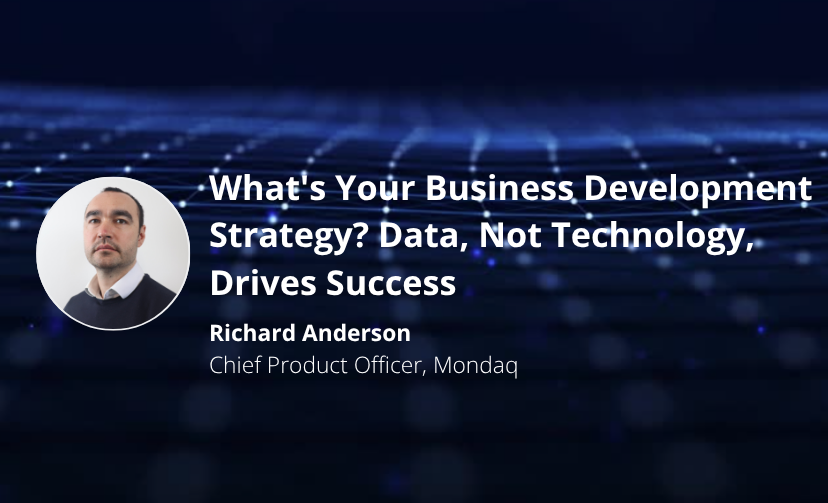As law firms race to adopt the latest artificial intelligence (AI) tools, industry experts caution that true progress begins not with the latest and flashiest technology - but with data.
“There’s a lot of noise, but firms need to focus on building a strong data foundation,” says Richard Anderson, Chief Product Officer at Mondaq. “It’s the quality and organization of data that will ultimately drive the success of any advanced analytics.”
At the same time, the legal sector is witnessing the unprecedented surge of technology solutions, with vendors now offering transformative capabilities for data integration and actionable insights. It’s rote by now, but no less true: the landscape is changing and it’s changing fast, Anderson notes.
It’s the firms that stay attuned to these developments — and take advantage of them — that will be best positioned to unify their data and make smarter, more strategic decisions.
The acceleration of AI and data strategies in law firms
Over the past year, the pace of change in legal marketing and business development has quickened substantially. Anderson observes a “massive push for AI” across the industry, with legal marketing teams now facing the same expectations as other business functions to leverage AI for efficiency, better decision-making, and added value.
“AI has helped drive and provide a catalyst for that,” he says, noting that the demand for robust data strategies has never been higher.
Crucially, this shift isn’t limited to large firms with dedicated marketing technology (MarTech) teams. Even in smaller firms, individuals are taking on more technology- and data-focused roles, reflecting a broader industry realization that data fluency is now essential.
The industry is also seeing both clients and vendors driving greater integration of data across platforms. Law firms are increasingly seeking ways to consolidate client information from multiple sources, aiming for a holistic view that can power more targeted business development and client outreach.
“Clients are asking more about how they can take our data and put it into data warehouses, from which to drive analytics and outputs; that’s really picking up traction,” Anderson notes.
Real-world impact: Data integration and AI in action
The marked response from vendors via new solutions designed to bring together multiple data sources makes it easier for firms to gain a holistic view of their clients and prospects. One standout example is Mondaq’s partnership with MyMai, an AI-powered platform designed to support personalized engagement at scale, specifically tailored for professional services firms.
Rather than simply feeding data into a CRM, MyMai analyzes what clients care about to propose personalized communications. This approach enables law firms to move beyond generic outreach and instead connect with highly relevant, timely information.
“Essentially, it generates email comms to an individual based on what they care about: what they read in Mondaq and what we’re seeing about that company in the news, for example,” Anderson explains, adding that the result is a more intelligent process that leverages a 360-degree view of each client or prospect.
“That is pure business development,” Anderson says. “Using that kind of data as a signal to understand intent — you’re starting to see some real success there, enabled by intelligent outreach.”
Overcoming common challenges — and why you should ‘just start’
However, recent advancements in AI are making this process more accessible. It’s helping firms categorize and structure their data more efficiently, making it “less of a leap.”
“One of the really strong use cases for large language models (LLMs) is taxonomizing content and there’s the ability now to do that at good scale,” Anderson explains, adding that combined with the growing number of MarTech specialists, effective data integration is no longer out of reach for any firm.
Regardless of size, expertise, or stage of their data journey, Anderson’s best advice remains straightforward: just start. He cautions against chasing the latest technology at the expense of the fundamentals. Ensuring data is accurate, consolidated, and structured will pay dividends whether you’re implementing advanced AI or simply running basic data analysis.
Against today’s backdrop, the firms that succeed will be those that balance innovation with intention. By building a robust data strategy and staying attuned to the latest advancements, law firms can harness the full potential of AI and analytics, delivering smarter, more personalized service to their clients — and carving out a true competitive edge.
“The market is moving quickly, with new solutions making it easier than ever to unify data and extract actionable insights,” Anderson says, adding that while firms should be open to new tools and partnerships, prioritizing a solid foundation is increasingly critical.
“Take a breath, take a step back, and focus on the data side of things. That’s where the real gains are.”
Originally published on Lexpert.

